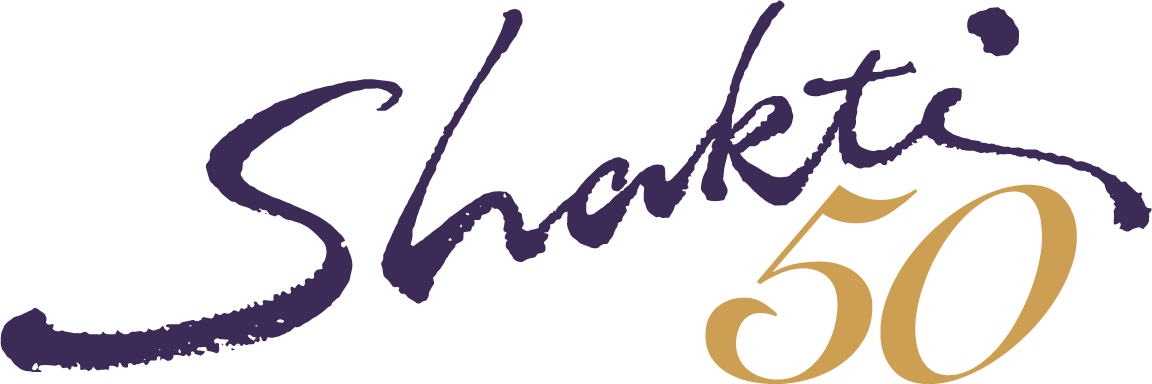Noted jazz journalist Bill Milkowski writes:
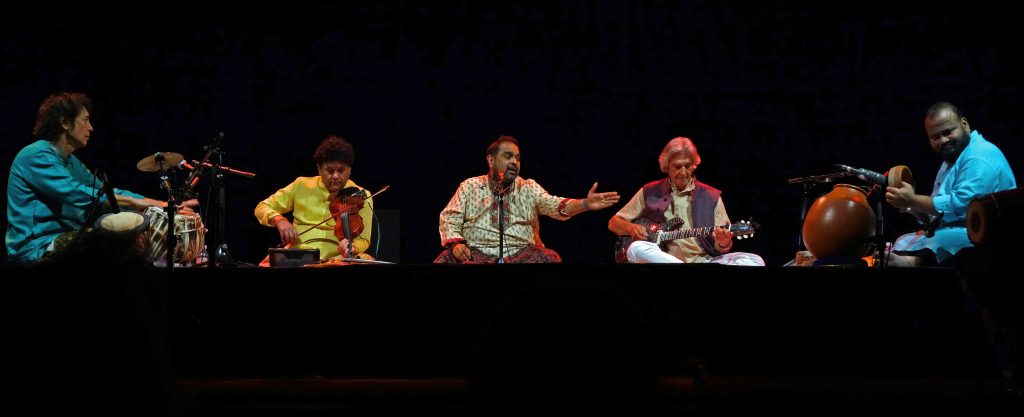
Guitar god of my youth, John McLaughlin, now 81, sat cross-legged on the carpeted dais floating in the middle of a spare stage at the Capitol Theatre in Port Chester, New York. It was yet another stop on Shakti’s international 50th Anniversary Tour, which commenced in the States on August 17 in Boston and continued into September with stops in California, Oregon, Illinois, Michigan, and Texas. Looking aged but elegant as always, John-ji engaged his audience of 1400 adoring fans — many, like me, who had witnessed Shakti in concert during their initial Stateside tour in 1976 or caught the later iteration of the group, Remember Shakti, in 2001 — by reminiscing about his own first time playing in the historic and Byzantine theatre built in 1926. It was 1970 when McLaughlin landed there with Tony Williams Lifetime, led by the preternaturally gifted drummer who had left Miles Davis’ second great quintet to form his own version of Cream; in essence, launching the fusion movement in the process. That was before John had formed Mahavishnu Orchestra, the seminal fusion juggernaut acclaimed for its complex, intense music melding rock, jazz, and Indian classical music. That band had also played at The Capitol Theatre back in the day.
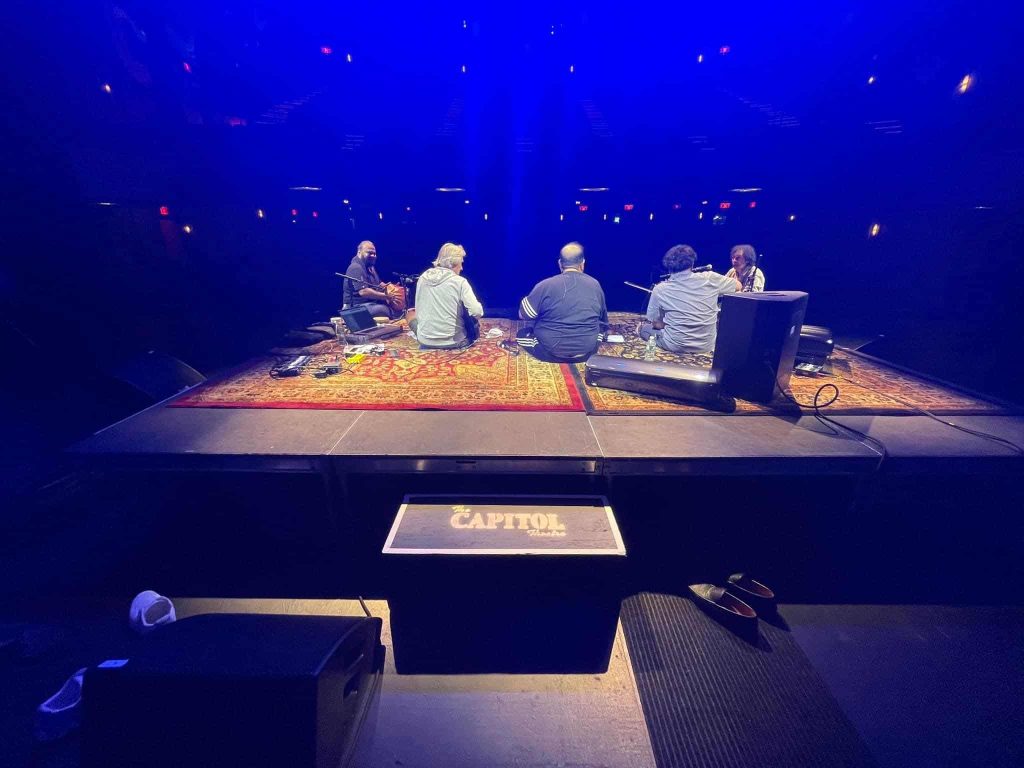
But on this August night in 2023, McLaughlin was hailed as a returning hero, and he delivered in dramatic, inspired fashion alongside his Shakti bandmates — tabla master Zakir Hussain, violinist Ganesh Rajagopalan, percussionist Selvaganesh Vinayakram and glorious vocalist Shankar Mahadevan, a huge pop star in his native country and leading composer in Indian film music. Together, they performed material from Shakti’s latest recording, This Moment (Abstract Logix), the group’s first studio album in 46 years, along with some memorable nuggets from the band’s past.
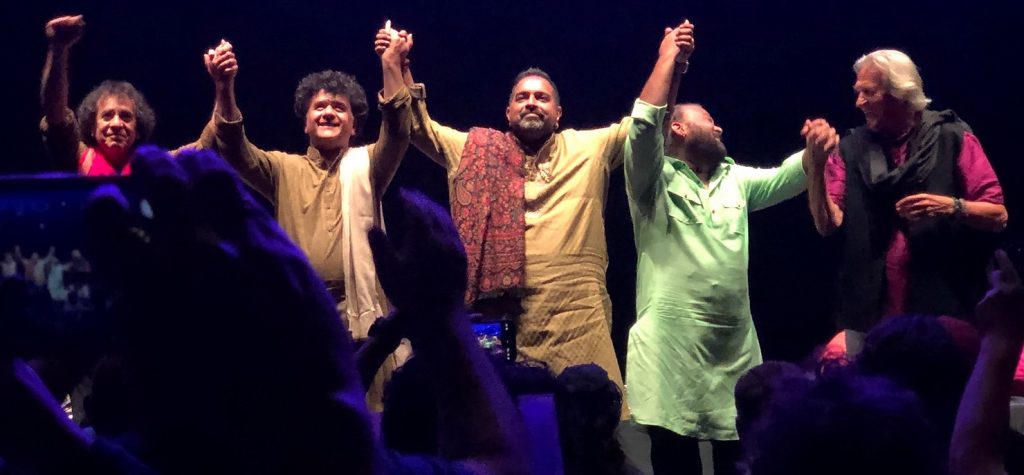
My own first memory of McLaughlin, whom I have seen in concert countless times in various settings over the past five decades, goes back to May 11, 1973, when the Mahavishnu Orchestra rode into my hometown of Milwaukee on the strength of the group’s second scintillating album, Birds of Fire, released in January of that year. Mahavishnu shared a bill that pivotal night at the Milwaukee Auditorium with Frank Zappa and the Mothers of Invention, who premiered new material from their upcoming album, Over-Nite Sensation, which would be released in September of that year. And while I was primed to hear Zappa, a guitar hero in his own right, I came away from that concert being completely blown away and awed by this angelic man dressed all in white who played with the ferocity of a demon.
Three months after that Milwaukee gig, the Mahavishnu Orchestra played the Schaefer Music Festival in New York’s Central Park (on Aug. 17 and 18, 1973, which was documented on the live album Between Nothingness & Eternity). Around that time, McLaughlin performed a one-off concert with an acoustic Indian flavored ensemble at Saint Thomas Episcopal Church in midtown Manhattan, marking the first public performance of Shakti. I would later see that incredible East-meets-West group on their first Stateside tour when they opened for Weather Report on May 18, 1976, at the Riverside Theater in Milwaukee.
Since that time, I have witnessed McLaughlin in concert with the One Truth Band in 1978, with The Guitar Trio featuring Al Di Meola and Paco de Lucia in 1980, with The Translators featuring Katia Labeque on synths and Tommy Campbell on drums in 1982 followed by a 1984 incarnation of the Mahavishnu Orchestra with Bill Evans on saxophone, Jonas Hellborg on bass, Mitch Forman on keyboards and Danny Gottlieb on drums and again in 1986 with Jim Beard on keyboards. I also saw John in various trio configurations between 1987 and 1992 with Trilok Gurtu on drums/percussion and either Jonas Hellborg, Kai Eckhardt or Dominique Di Piazza on bass. I caught him again in 1996 with his Free Spirits organ trio featuring Joey DeFrancesco and drummer Chambers, in 1997 with his Heart of Things band with bassist Matthew Garrison, tenor saxophonist Gary Thomas, keyboardist Jim Beard and drummer Dennis Chambers, and then with a new incarnation of Shakti (now dubbed Remember Shakti with the marvelous mandolin maestro U. Shrinivas replacing violinist L. Shankar in the group) at the Montreal Jazz Festival in 1999 and then again at the Beacon Theatre in New York on Nov. 5, 2000 and at the Central Park Summerstage on June 28, 2001.
In 2007, McLaughlin unveiled his 4th Dimension Band (with bassist Hadrian Feraud, keyboardist Gary Husband and drummer Mark Mondesir) at a Town Hall concert, then in 2009 he appeared along with Chick Corea, bassist Christian McBride, alto saxophonist Kenny Garrett and drummer Brian Blade in the Five Peace Band at Jazz at Lincoln Center’s Rose Theatre. In 2012, I caught John trading licks with fellow guitar hero Mike Stern at the Nice Jazz Festival and the following summer of 2013, he brought his 4th Dimension Band into New York for a week-long engagement at the Blue Note, and I attended every night. Later that year, in October of 2013, I was part of an intimate gathering to witness John playing duets at the Metropolitan Museum of Art with pianist Gary Husband in a demonstration of Paul Reed Smith Guitars, following a ceremony in which the luthier presented one of his custom instruments to be part of the permanent display at the museum. Then on Dec. 10, 2016, McLaughlin appeared at the Blue Note in a special Return To Forever-meets-Mahavishnu Orchestra concert (with Lenny White on drums, Victor Wooten on bass and guests Bela Fleck on banjo, Kenny Garrett on alto sax and Wallace Roney on trumpet) as part of Chick Corea’s eight-week residency at the New York City nightclub.
Fast forward to 2017, when McLaughlin returned to Town Hall on his “Meeting of the Spirits” tour that combined his 4th Dimension Band with fellow guitarist Jimmy Herring’s Invisible Whip band into a 9-piece amplified orchestra that recreated vintage Mahavishnu Orchestra material from The Inner Mounting Flame, Birds of Fire and Visions of Emerald Beyond. It was billed as John’s farewell tour of America (due to a debilitating arthritic condition in his hands he was reportedly going to retire from touring). As he said at the time, “The American tour is it for me because the situation with my hands is deteriorating. Short of a miracle, I think that’ll probably be it, at least in terms of touring.”
After completing that Stateside “Meeting of the Spirits” tour, McLaughlin would return to his home in Monaco, where he subsequently recorded 2020’s beautiful, orchestral-sounding Is That So? with fellow Shakti members Zakir Hussain and Shankar Mahadevan recording their parts remotely from their homes in San Francisco and Mumbai, respectively, and also 2021’s Liberation Time, both recorded during the COVID-19 pandemic.
Following a seemingly miraculous cure from his arthritic condition, McLaughlin was back on the road with a new edition of Shakti, featuring his longtime musical partner Zakir Hussain on tabla, Selvaganesh (from Remember Shakti) on ghatam, Shankar Mahadevan on vocals and newest member Ganesh Rajagopalan on Carnatic violin. Following a European tour earlier in 2023, they came to the States during the summer to celebrate the group’s 50th Anniversary in a 27-city tour that stretched from Boston to San Francisco. The tour was in conjunction with the release of Shakti’s first studio album in 45 years, This Moment, which has since been nominated for a Best Global Music Album Grammy.
For longtime Shakti fans like me, their stop at The Capitol Theatre in Port Chester, NY (about a 90-minute drive from my home in West Hartford, CT) was a peak experience.
Opening the concert with an adrenalized “5 in the Morning, 6 in the Afternoon” (from 2000’s Remember Shakti), it was clear from the outset that McLaughlin’s legendary chops were very much intact. This was a great relief to fans who had mourned his announced retirement from touring in 2017 due to complications from arthritis in his hands. But John-ji was in peak form in Port Chester, shredding like the guitar hero of old on his tastefully distorted Paul Reed Smith electric guitar (as opposed to his original Abe Wechter-built acoustic Shakti guitar with scalloped fingerboard and sympathetic drone-strings transversely across the sound hole). In fact, McLaughlin performed in jaw-dropping fashion throughout the volcanic set, seemingly merging his Mahavishnu past and Shakti present.
It was also interesting to note throughout the concert how often McLaughlin worked downhome Delta blues phrases into the fabric of this East-meets-West mélange, as he did on this opening number which alluded to the riff from Muddy Waters’ “Rollin’ and Tumblin’” at times throughout “5 in the Morning, 6 in the Afternoon.” McLaughlin kicked off the buoyant “Zakir” (from 1999’s Remember Shakti) with some stunning solo guitar that highlighted his beautiful chordal melody playing. He was soon joined by lyrical violinist Rajagopalan, a new addition to the Shakti lineup, replacing the late mandolin master U. Srinivas, who died eight days after having a liver transplant in 2014. Rajagopalan’s singular solo flights were not only astounding, but his tight chemistry with McLaughlin also brought back memories of the group’s original violinist L. Shankar. Following that gentle piece, the band tackled “Ann” (from The Believer), a more aggressive number that incorporated Mahavishnu-esque unisons between guitar and violin, underscored by the stunning rhythm tandem of Hussain and Selvaganesh. Violin and tabla then engaged in some rapid-fire call-and-response statements that were staggering in their sheer speed, crisp articulation, and intensity.
Vocalist Mahadevan, a regal presence with a Pavarotti-sized authority on the bandstand, was brought on stage as “the fifth member of Shakti” for a beautiful rendition of the traditional South Indian Kriti, “Giriraj Sudha,” a calming number from the new album that developed into a whirlwind Carnatic jam midway through that was brimming alternately with impossibly tights unisons and exhilarating call-and-response lines between violin and voice. These exhilarating exchanges were once again spurred on by the churning pulse of Hussain’s remarkable tabla work locked in an indelible hookup with Selvaganesh’s kanjira (South Indian frame drum).
“Shrini’s Dream,” a tribute to the late mandolin maestro that also appears on This Moment, was a showcase of some sizzling speed licks by McLaughlin and dazzling unisons between Mahavedan and Rajagopalan. Next up was the beguiling “Sakhi,” a glorious number from McLaughlin’s orchestral pandemic album, Is That So? that showcased Mahadevan’s transcendent vocal powers. Midway through this majestic tune, the band broke into a double-time flurry, unleashing more Mahavishnu-esque fusillades. Their gentle rendering of the plaintive melody “Lotus Feet” (from Shakti’s 1976 debut album) was met with knowing applause by this Capitol Theatre crowd. They followed with the buoyant “Bending the Rules” (from This Moment), involving more intricate unisons between voice and violin at a breakneck pace.
“Finding the Way” (from The Believer) was laced with blue notes from the guitarist, including a funky/catchy chordal riff that sounded borrowed from Lee Morgan’s boogaloo hit, “The Sidewinder.” McLaughlin even snuck in a little taste from the Mahavishnu Orchestra song “You Know You Know” (from 1971’s The Inner Mounting Flame) at the :50 mark of the video below before unleashing on a flurry of mind-boggling unison lines that were strictly in an Indian mode. They closed with a rousing rendition “La Danse du Bonheur” (from 1977’s Handful of Beauty) that included an explosive display of konnokol (the art of performing percussion syllables vocally in South Indian Carnatic music, or a kind of Indian scat singing if you will) by the incomparable battery of Hussain and Selvaganesh. And they encored with the hauntingly beautiful “Bridge of Sighs” (a tune from 1977’s Natural Elements), reminiscent in tone of McLaughlin’s classic ballad “Follow Your Heart.”
Between the new album and Shakti’s triumphant 50th Anniversary Tour, this pioneering force in world music is still vital after all these years.
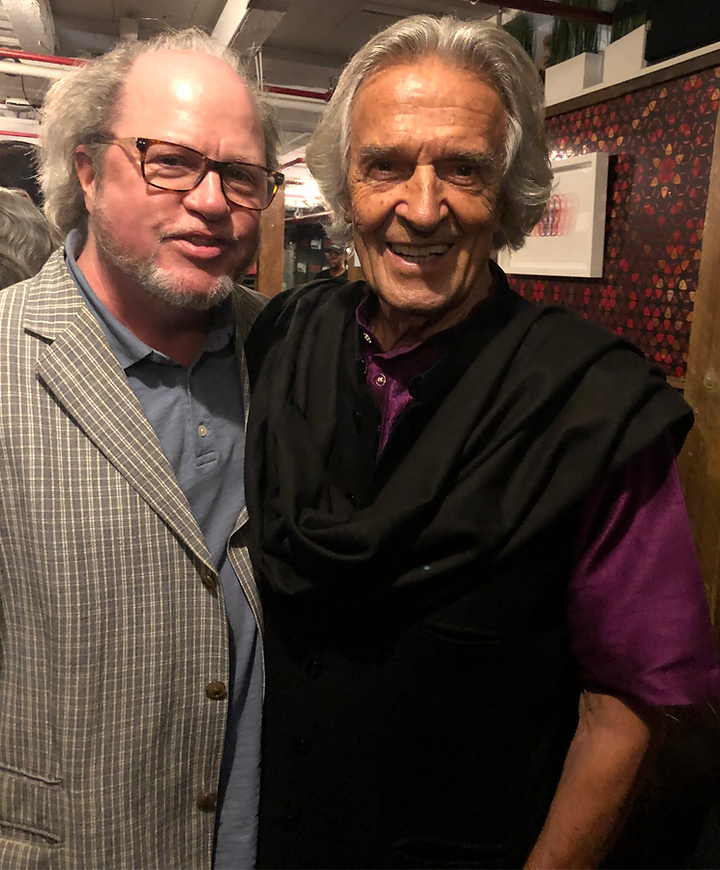
Some Additional Comments From Those Who Witnessed Shakti in Concert:
Joel Harrison
Guitarist-composer-bandleader and founder of the Alternative Guitar Summit
I was dumbfounded and maybe permanently altered after seeing Shakti. I saw John at Town Hall some five some years ago and what was supposed to be a farewell tour. He publicly stated that his arthritis was too problematic to continue. And when I spoke to him about it after the show, he seemed resigned to never touring again. But for him to return so triumphantly, playing so incredibly again, some kind of voodoo had to have occurred. I read in interviews that he simply started saying “I love you” to his hands, and the pain disappeared. There must be more to the story. I’ve tried telling my hands that I love them, and they’ve spurned my advances. But then John’s life is clearly unique. There are traits that defy common logic and the visible laws of the natural world.
The most salient point I can make about John, at age 81, is this: He invented a new kind of music. How many people have done that? Furthermore, at this late stage the unique blueprint he made sounds better than ever. I have deeply considered the concept of fusing the music of multiple cultures my whole adult life. I’ve made my own “hybrid” records with my collaborator, sarodist Anupam Shobhakar. But what John has done with Shakti, and doubled down on with this last record, makes all so-called Indian /jazz hybrids sound aspirational. Unlike most everyone else, John has completely mastered both sides of the equation. Shakti is essentially South Indian music played by a jazz guitarist.
I heard that John collaborated on the new compositions during the pandemic over skype with Vikhu, Shakti’s original percussionist and Selvaganesh’s father. The depth of this union is profound. It is seamless. Having collaborated myself with Selvaganesh, I can hear the obvious Carnatic rhythmic imprint. However, there’s never a feeling of anything being forced. It’s a lesson in our common humanity, and a model for all composers. What makes it more so is that John’s playing is freer in a harmonic context than ever before. It’s as if something in him let go, and he’s experiencing some sort of ecstatic freedom. In the first Shakti records he stays fairly close to the ragas. With this record he advances into extended jazz harmony, and it’s like a cascade of colors or spices. To me, his phrasing has never sounded so beautiful. It all seems absolutely effortless. But of course, it’s not. I was told by insiders that during this tour John never put the guitar down. This degree of obsession and dedication is very moving to me. You have every right at age 80 to slow down. He’s done just the opposite.
The addition of the singer to this group is brilliant. The vocals add an element of heart to the ensemble, elevating it into the universal sphere. Also, the compositions are deeply considered, all different from one another. In the original Shakti there were a number of similar sounding (and amazing) pieces that were essentially one- chord blowing sessions. Not this time. There’s a lot of nuance and mediation in the structures.
As for John’s tone— having been effusive in praise, I will admit that over the past decades I have not been a fan of his sound. I prefer the unhinged Mahavishnu tone to the sound of the PRS plugged into the board. However, I loved his sound on the show. I don’t know if he did anything differently. It just worked. And by the way, I saw Mahavishnu in 1973. Hard to believe I had my life changed by this man twice over a span of five decades!
The delight with which these players interacted with each other was infectious. He and Zakir—over 50 years! I suppose you could call this a supergroup. Everybody is the best at what they do. Sometimes supergroups disappoint us. The parts don’t always add up to the whole. But obviously it’s John’s strong guidance, and his interest and investment in the brilliance of his collaborators, that makes this unit one of the great groups of our lifetime. There is none like him. And will never be again. The next few generations will be running as fast as they can to catch up. It’ll be like chasing the wind.
Jimmy Herring
Guitarist-composer has played with Widespread Panic, Aquarium Rescue Unit, Jazz Is Dead, Phil Lesh & Friends, The Other Ones, Project Z, The Ringers, The Invisible Whip
I saw Shakti in Nashville. And my biggest regret is that I didn’t see more of them on that tour. I was really bummed because they played Atlanta, which is near where I live, but I had to work that night, so I had to miss that show. Their next gig was in Nashville at the Ryman Auditorium, which is a historically great place. And I made that four-hour ride there because this was a once in a lifetime thing.
I’m very familiar with Shakti, but this concert was different somehow. I mean, to see these masters just having fun. I mean, they were making it look so easy. And I have to say, I don’t know how John could be playing any better. I mean, it was devastating! And the groove was just compelling. So many times during their set at Ryman, people would be on their feet in the middle of compositions, screaming. I mean, they got standing ovations multiple times, even in one song. It was just amazing. The title of the new Shakti album is This Moment. That says it all because this music was so in the moment.
What struck me about John’s guitar tone was how warm yet penetrating it was. He was playing that new Paul Reed Smith signature model, with just a touch of distortion on it. It was one of the greatest sounds I’ve heard him have in a long time. He seems to have really embraced the modern era of getting guitar sounds that sound loud but really aren’t that loud at all. Hearing him sound that freaking good through a computer or whatever he was playing through, I was blown away. And it made me think, “Man, I’ve got to at least kind of change with the times a little bit, ‘cause I’m still doing it the dinosaur’s way.
But John was playing so damn good throughout this concert at the Ryman. You can’t play any better than that. I mean, you take his knowledge of those rhythms and his incredible knowledge, and you put them together in this language of music that only exists within his world, and it’s magical. Because he’s such a hybrid of all these things — jazz harmony, Indian rhythms, and then everything else that he brings to the table. Yeah, it was so great, and really inspiring.
Everything was working on all cylinders. And I saw only the one show in Nashville, but I’ll bet they were all different from night to night. That’s how ‘in the moment’ the music was.
To me, each one of those musicians in Shakti is so inspired and divinely inspired. It was like they levitated while they were playing. And we’re not just talking about chops. I can’t say enough about the spiritual connection that they have with each other and with that music. I mean, it’s really hard to put into words. It’s mind boggling, really. And yet, these musicians are the most humble people you’ll ever meet. They walk up to you after the show, and they bow to you. And it’s like, “Wait a minute! Let me get on my knees and kiss your feet!” You know? That’s how masterful they are. It’s ridiculous man. And there’s so much more than chops in the equation. I mean, that’s the least important thing. It was all just absolutely devastating.
Bela Fleck
Banjoist-composer, leader of The Flecktones, collaborator with Chick Corea, Edgar Meyer, Jean-Luc Monty, Stanley Clarke, Abigail Washburn, Zakir Hussain, Toumani Diabaté
I opened 10 of the shows for Shakti in Newark, Philadelphia, D.C., Atlanta, Cary, NC, Columbus, OH, Chicago, Ann Arbor and Austin. I loved the chance to hear John play on the same pieces every night, because it helped me to better understand his current unique language. His technique is so unusual, it seemed to me that he wasn’t a big pinky finger guy, which surprised me. The speed seemed to come from mostly using the index, middle and ring, and he seemed to have evolved towards note choices that those fingers enabled. It helped me understand why certain chromatic notes were in his phrases and not other ones. The way his hands work are particular to him. I guess we all do the same things, build language out of things that are idiomatic to us as players. But nobody does what he does.
His enthusiasm is another important component. John plays and attacks the whole experience not as a job that he needs to get through, but as a passionate living experience. Even near the end of the tour, the band found things to work on and improve, and I found that inspiring and familiar as well.
My own earliest memories of hearing John on record were in the Mahavishnu Orchestra. My big brother had the LPs and would play them. John was one of the more intimidating musicians to hear as a developing player in that with some great players you could imagine doing something like that, but with him, it was off the table. Impossible. When I joined New Grass Revival in 1981, Shakti was always an inspiration, Sam Bush being a huge fan. And we listened to the first record many times on tour.
John and Zakir have had a profound and famous old friendship. If you can still be playing with someone 50 years later, you are definitely someone who can get along with folks! Zakir is someone I am fortunate to know well and have collaborated with (their 2023 album As We Speak also features bassist Edgar Meyer and bansuri player Rakesh Chaurasia), so I understand where he is coming from. Being around them together, I could see places where Zakir had learned things from John and vice versa. I believe they both feel incredibly lucky to have found each other, and I’d say we all are! Playing with Zakir is one of the great, albeit unlikely, things that has happened to me in my musical journey. I love that he and John are at the top of there game in their 70s and 80s and no-one can do what they can do, even now. In fact, no-one ever could.
Bill Frisell
Guitarist-composer-bandleader, collaborator with Paul Motian, Charles Lloyd, John Zorn, Jan Garbarek, Tim Berne, Elvis Costello, Vernon Reid, Gary Peacock, Ron Miles, Andrew Cyrille, Mary Halvorson, Jakob Bro, Marc Johnson, Eberhard Weber, Julian Lage
I was invited to open for Shakti at the Mondovi Center for the Arts in Davis, California. September 8, 2023. I played a short solo set before their concert. It’s difficult to find the words; to say this was an honor would be an understatement. I almost can not believe it actually happened. Seems more like a dream. Dreams do come true. It was a joy to hear them. The band is incredible. John is playing better than ever. Full force. They blew my mind. Again. Below are a couple things I wrote prior to that concert:
- John McLaughlin (Part 1) — Brooklyn, May 21, 2023
I love music. I cannot believe it’s been more than 50 years now, but I remember so clearly the moment. I had just graduated high school. Dreaming about possibilities. The excitement and anticipation bringing home the new Miles Davis album. What was going to happen next? In a Silent Way. Here were the very first notes I heard John McLaughlin play and where my love for his music began and continues to this day. Stunning. Life-changing. The mystery. The beauty. The SOUND. I’ve been chasing it ever since. The challenge. I’ll never get there, but I’m going to keep trying. What a gift! Lifetime. It’s still happening. Just beginning. So much joy and inspiration. I love John McLaughlin. I love music. Thank you John.
- John McLaughlin (Part 2) — Riverhead, July 27, 2023
The first time I heard Shakti. It must have been early 1975. I had on my tuxedo, sitting in the dressing room of this Las Vegas style supper club in Denver. I was playing in a band backing up Frank Gorshin. Does anyone remember him? He was an actor, comedian, impressionist who you’d see often on all of those talk shows in the ’60s. He played the part of The Riddler in the original Batman TV series. I was alone back there waiting for the gig to start. There was a small black and white tv tuned to the local PBS station broadcasting a performance from Wesleyan University. This was where I first heard Shakti. Their first album hadn’t come out yet. What was this?! I could not believe what I was seeing-hearing. It was like on Star Trek where you’d be instantly teleported to another planet. Another universe. Molecules taken apart and put back together. You find yourself in another world. A whole new world.
John McLaughlin had already done this to me a few times before with Tony Williams Lifetime, Miles, and the Mahavishnu Orchestra. Now this! Everything changes. A couple years later I heard Shakti live for the first time at a concert in Boston. It was so overwhelming. There was a moment then where I thought I should stop playing. This was too much. Impossible. There’s no way. This is too big!
But then, I thought…No. Wait. I love music so much. Music is beautiful. Whatever I can do with whatever it is I’ve got, I’m going to try as best I can to make something out of it. Maybe I can’t do what they are doing, but I’m going to find a way to do something. Music is big enough for everyone. Infinite. We all find our own way. Our own voice.
John Scofield
Guitarist-composer-bandleader, worked with Miles Davis, Charles Mingus, Chet Baker & Gerry Mulligan, Billy Cobham, Joe Henderson, Dave Liebman, Joe Lovano, Herbie Hancock, George Duke, Medeski Martin & Wood, Larry Goldings, Dr. John, Gov’t Mule, Franco Ambrosetti, Jack DeJohnette, Chris Potter, Gary Burton, Phil Lesh & Friends
I opened three shows for Shakti — Boston, Port Chester and Nashville — playing solo with my looping pedal. And it was so great getting to watch those guys play each night. John
was so generous with the other musicians, and interactive as well. I was so impressed with the band, the way they worked together with the addition of that singer (Shankar Mahadevan). It was phenomenal.
John remains such an exceptional guitarist. He sort of set the bar for technique in the late ‘60s and it’s still there. What he did at the time that he came on the scene changed guitar for everybody. I mean, I never heard anybody play the guitar like that, technically. That right hand….man! Just amazing. But also, his whole presence and style of music is so unique. And he managed to keep that together and grow it through the years.
The first time that I saw John McLaughlin play live was when I took the train from Wilton, Connecticut to Manhattan to see him with Tony Williams Lifetime at Slug’s in the East Village. It was the first set and nobody was there, but the music was incredible! And then I heard them again at the Capitol Theatre in 1974 when they had Jack Bruce in the band. I also heard an interesting gig that John played before Shakti. This was probably ’72-’73. It was John McLaughlin and Larry Coryell playing acoustic guitars at a macrobiotic restaurant in Westport, Connecticut with their wives — Julie Coryell and Eve McLaughlin — playing these accordion-like drone instruments (shruti boxes). It was the beginning of John going in that direction that he would later pursue with Shakti.
I finally met John in 1975 when I was in Billy Cobham’s band. We did a lot of gigs opposite Shakti in ’75 and ’76, and he was so nice to me. I was just a rookie and John went out of his way to be very supportive and encouraging to me. It’s a really special memory that I have of John.
Oz Noy
Israeli-born guitarist-composer who has collaborated with Dave Weckl, Will Lee, Vinnie Colaiuta, Eric Johnson, John Medeski, Dweezil Zappa, and has 12 albums as a leader, the latest being 2023’s Triple Play with bassist Jimmy Haslip and drummer Dennis Chambers
I saw Shakti at The Capital Theatre in Port Chester, New York, and what struck me about John’s playing that night was that it looked pretty effortless, and the communication between everybody was amazing! It gelled together and sounded like one big sound instead of a few guys playing separately. It just sounded so organic. Regarding John’s tone on his Paul Reed Smith guitar, honestly, I always wished he would play with an amp the last few times I’ve seen him. But on this particular night, that sound he got was so immediate and direct that it worked very well with this music; it didn’t overpower the rest of the band. I also thought his technique was great, and his musical ideas flowed effortlessly; it was pretty amazing to see someone on such a high improvisational level at the age of 81…or at any age!
I had never seen Shakti in concert before; I only knew the albums. So, for me, it was a spiritual experience to hear and see this music live. Deep and profound. I loved every minute of it!
